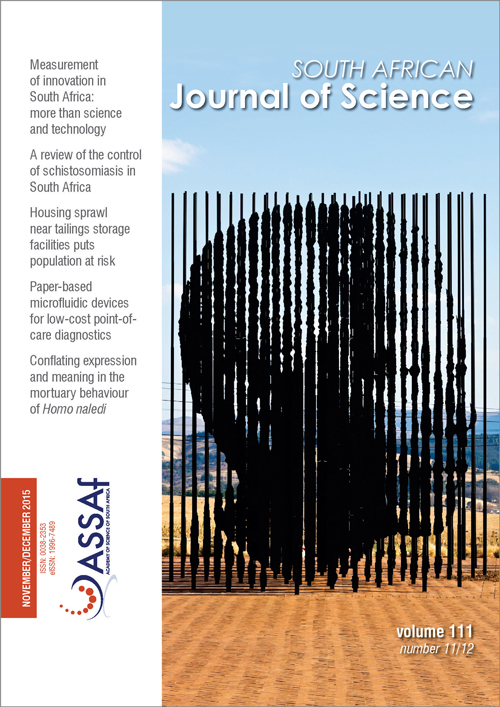In-vitro effects of protease inhibitors on BAX, BCL-2 and apoptosis in two human breast cell lines (with corrigendum)
DOI:
https://doi.org/10.17159/sajs.2015/20140417Keywords:
lopinavir, ritonavir, apoptosis, breast cancerAbstract
Currently, the treatment of choice of HIV/AIDS in South Africa is the multidrug combination regimen known as HAART (highly active antiretroviral treatment). HAART, which commonly consists of nucleoside or non-nucleoside reverse transcriptase inhibitors and protease inhibitors, has radically decreased mortality and morbidity rates among people living with HIV/AIDS. The emphasis of the original development of the antiretroviral drugs was on clinical effectiveness (reducing mortality). Presently, emphasis has shifted from the initial short- term considerations to the long-term undesirable or harmful effects induced by this treatment regimen. Whether antiretroviral compounds are oncogenic is widely speculated, which led to this investigation into the effects of protease inhibitors on the expression of key apoptotic regulatory genes, BAX and BCL-2, in two human breast cell lines, MCF-7 and MCF-10A by real-time qPCR gene expression and immunofluorescence. The anti-apoptotic effects of the protease inhibitors – LPV/r were also investigated by cell death detection ELISA and acridine orange staining. This study also evaluated the cytotoxicity of the antiretroviral drugs in normal and cancer cell lines of the breast (at clinically relevant concentrations of the drugs and at different time points, 24–96 h), employing the neutral red uptake assay. The drugs and combinations tested did not alter BAX and BCL-2 gene expression and protein expression and localisation in both cell lines. In addition, the protease inhibitors–LPV/r did not inhibit camptothecin-induced apoptosis in both cell lines. We have shown that the protease inhibitors demonstrated varying degrees of cytotoxicity in the breast cells. The resulting DNA damage associated with cytotoxicity is strongly implicated in the processes of tumour initiation.
Additional Files
Published
Issue
Section
License

All articles are published under a Creative Commons Attribution 4.0 International Licence
Copyright is retained by the authors. Readers are welcome to reproduce, share and adapt the content without permission provided the source is attributed.
Disclaimer: The publisher and editors accept no responsibility for statements made by the authors
How to Cite
- Abstract 420
- PDF 591
- EPUB 212
- XML 230
- Corrigendum 127












.png)